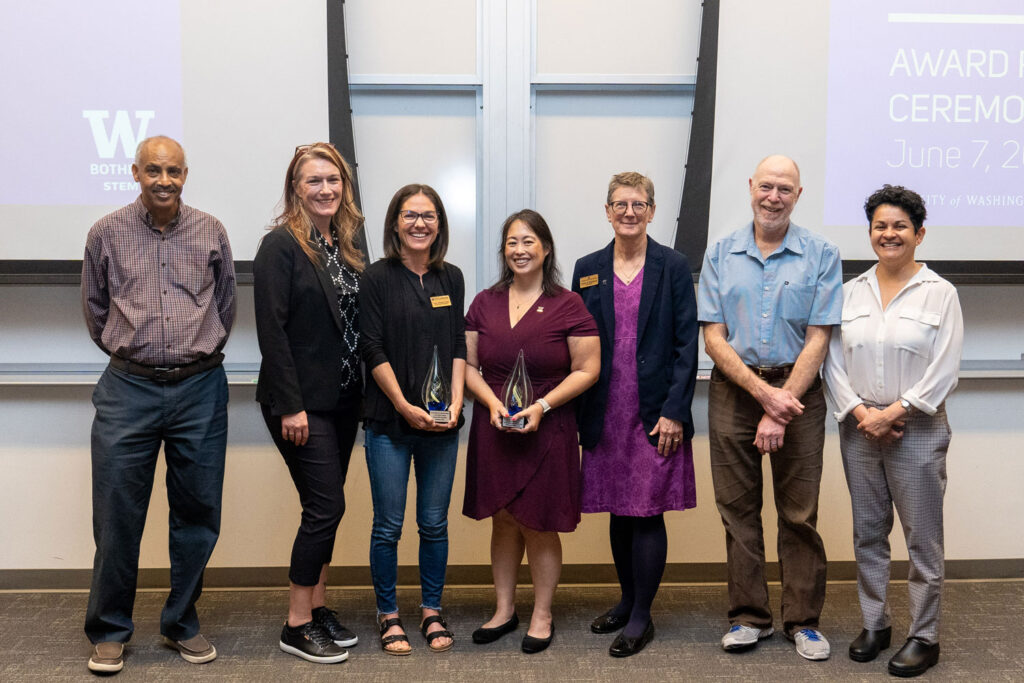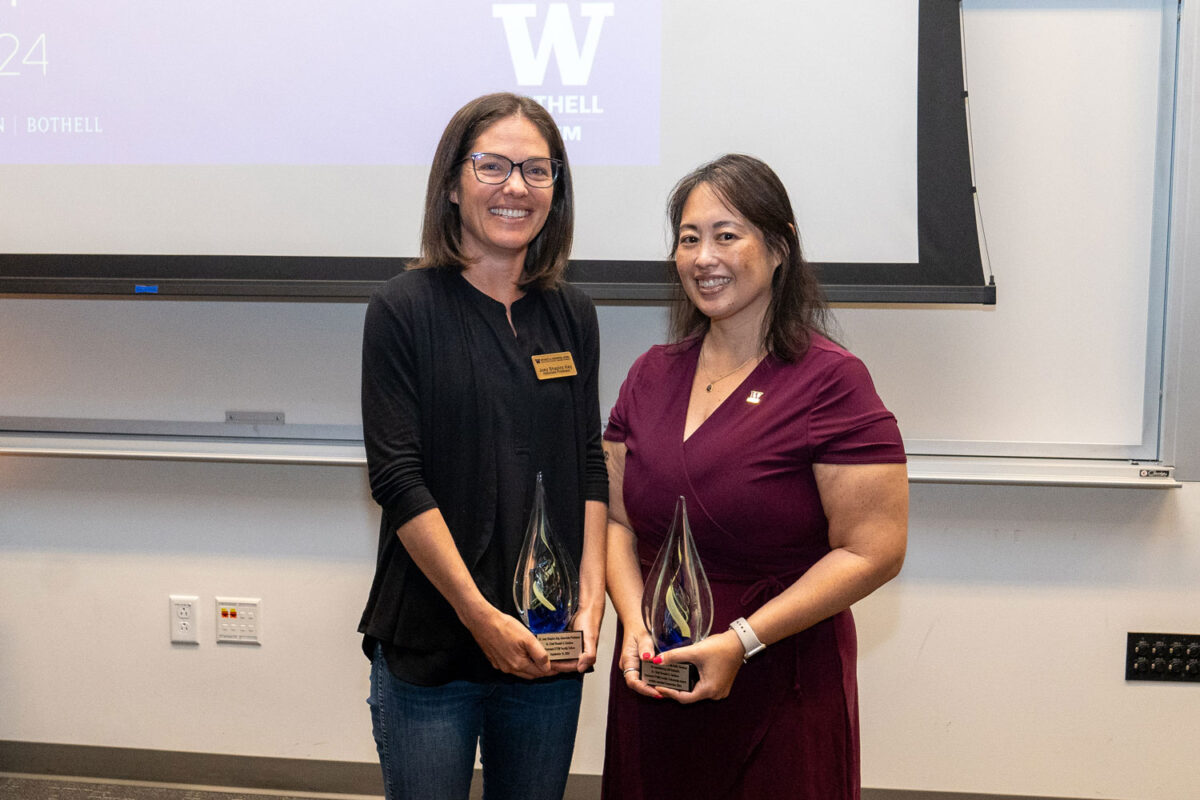In higher education, funding through grants and endowments is an important way to support the work of both faculty and students. The generosity of donors can make possible everything from groundbreaking research to transformative educational experiences.
Often, these donors come in the form of familiar faces — alumni looking to give back to their alma mater and leave a legacy gift that will benefit future generations.
In 2019, University of Washington Bothell alumna Michelle Gamboa (Computer Science & Software Engineering ’05) made one such gift by establishing the Sr. Chief Ronald G. Gamboa Endowed UW Bothell STEM Faculty Fellowship, the first endowed faculty fellowship at UW Bothell.
Her pledge of $100,000 over five years is one of the largest gifts to UW Bothell from any alumni. It was augmented by an additional $50,000 anonymous donor grant through UW Bothell, bringing the total to $150,000. Gamboa said that while supporting students is critical so is supporting faculty.
“Given my gratitude to the teachers in my life, I knew my contribution would be to the faculty who make UW Bothell so special,” Gamboa said.
The fellowship is intended to recognize faculty members who serve as exemplars in undergraduate research mentorship. Earlier this year, UW Bothell’s School of STEM awarded the inaugural fellowship to Dr. Joey Shapiro Key, associate professor.
A legacy passed on
In her educational journey, Gamboa had no greater supporter than her father, whose passion for learning and mentorship shaped her own philosophy around education. On Feb. 16, 2000, he lost his battle to cancer and died just before his 48th birthday.
“So, in honor of my father who encouraged me to pursue my education and is the most influential person in my life, I made a contribution that was meaningful to me — and that could influence others,” Gamboa said.
She hopes her father’s legacy will live on through the gift and enable others to inspire the next generation, just as he did. “I believe that someone’s path in life can change in a moment,” she said. “All it takes is a person or an experience that influences that person and gives them a spark of inspiration. I hope to help faculty create more opportunities for students to learn, grow, succeed and experience more sparks of inspiration.”
Fellowship recipients are nominated by peer faculty and selected for their success creating supportive environments for students to flourish, preparing them as researchers and inspiring them to make a positive impact in their broader community. For Dr. Dan Jaffe, STEM professor, Key stood out as someone who embodied the tenets of the fellowship for her research work with undergraduates. He nominated her for the 2024-25 fellowship year.
“Dr. Joey Key has done outstanding work to engage many UW Bothell undergraduates in research, but she has especially worked to promote and encourage the participation of underrepresented students in STEM research,” Jaffe said. “She does high-level research in astrophysics, and her research students have worked in partnerships with scientists around the country and world.
“Her record is one that strongly supports the School of STEM’s mission to be a leader in STEM education for Washington state.”
“Dr. Joey Key has done outstanding work to engage many UW Bothell undergraduates in research, but she has especially worked to promote and encourage the participation of underrepresented students in STEM research.”
Dr. Dan Jaffe, professor, School of STEM
The final frontier
Key’s research in astrophysics predominantly centers around the study of gravitational waves. She first became interested in this cutting-edge area of research while studying physics as a graduate student at Montana State University in Bozeman, Montana. When she switched to a new research topic in graduate school, Key set out on a path to contribute to the next frontier of space research.
Gravitational waves are caused by massive objects accelerating in the universe and stirring up space and time. By studying these ripples, scientists can learn more about the systems that make them.
“The really cool thing about gravitational wave astronomy is that it’s a new way to observe the universe,” Key said. “Everything we previously knew about the universe came from different kinds of light. But in 2015, that changed.”
Key fondly recalls the moment when the first waves were detected while she was working at the Center for Gravitational Wave Astronomy at the University of Texas Rio Grande Valley in 2015. Now, in her classes at UW Bothell, she brings her excitement for the subject into the classroom and often invites students to join her ongoing research.
While much of the research she and her students do involves remotely analyzing data as it comes from the Laser Interferometer Gravitational Wave Observatory detectors, she enjoys bringing her student researchers to visit the LIGO Hanford Observatory in Richland, Washington, to see the massive L-shaped detectors, with each arm stretching 2.5 miles.
Key collaborates internationally with fellow researchers from LIGO as well as from the National Aeronautics and Space Administration and the European Space Agency. In June 2024, Key was selected by NASA to serve as a U.S. member of the international Laser Interferometer Space Antenna Science Team, which will be launching an instrument to observe gravitational waves from space in the 2030s.
A gateway science
In addition to her work in gravitational wave astronomy, Key is interested in educational research to better understand how best to teach physics and astronomy to diverse student populations. One of the things she enjoys most about her field is its potential as a “gateway science” — as almost everybody likes space, she said.
“I want students to know that everyone has something to contribute. A lot of people think about science as being exclusionary, but there’s a lot of work to be done,” Key said. “Science doesn’t mean being the most brilliant person sitting in a lab on your own. It means working in a team, contributing what you have to offer. It takes lots of different kinds of people and ideas to make it happen.”
Through UW Bothell’s STEM Public Outreach Team, Key works to make science more accessible and to inspire the next generation of science lovers and mentors alike. Each year, a group of trained undergraduate student “ambassadors” present on STEM topics to pre-kindergarten through community college audiences throughout the greater Seattle area.
For senior Jayron Yucker, a Physics major, becoming a student ambassador seemed like a great way to get public speaking experience and learn about other STEM topics that relate to his major. “Speaking in front of a crowd is super nerve-wracking, but with lots of practice, you get more comfortable,” he said.
As he’s grown more confident in speaking, Yucker said he’s also come to like the experience of interacting with and inspiring younger students. “When doing the presentations, it gives me joy to see all the excitement and curiosity in the kids listening,” he said.
He recalls being awed by similar presentations when he was in elementary school. “Now it is exciting to be the person to give the presentations. You never know whose curiosity and interest you’ve just sparked.”

Design to expand access
With funds from the fellowship, Key will be able to open opportunities for more undergraduate students to do research and public outreach. The award will support quarterly stipends for up to 10 new SPOT ambassadors during the 2024-25 school year.
“Michelle Gamboa’s endowed faculty fellowship not only celebrates the outstanding work that School of STEM faculty do with undergraduate students but also invests in their future initiatives moving forward,” said Dr. Jennifer McLoud-Mann, interim dean and professor in the School of STEM.
“Joey Shapiro Key, the first recipient of this faculty fellowship, excels in undergraduate research mentorship and serves as an exemplar for how we transform lives, one student at a time.”




